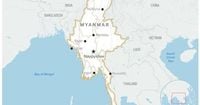On the evening of October 6, 2025, tragedy struck the small village of Bon To in Myanmar’s Sagaing region, as a motorized paraglider attack carried out by the country’s military left at least 24 people dead, including children, and wounded more than 50 others. The incident, reported by multiple international outlets including the Associated Press and Upworthy, has sent shockwaves through a nation already battered by years of civil conflict and military repression.
The attack unfolded during what should have been a peaceful and joyous occasion. More than 100 villagers had gathered at Bon To’s primary school compound to mark the end of Buddhist Lent with an oil lamp lighting ceremony. The event also doubled as a rally calling for the release of political prisoners, including the country’s ousted leader, Aung San Suu Kyi, who has been held by the military since the 2021 coup. According to a member of a local resistance group who attended the event and spoke to the Associated Press on condition of anonymity, the gathering was intended to be a symbol of hope and resilience in the face of ongoing military rule.
But as dusk settled over the village, the mood shifted abruptly. At around 7:15 pm local time, a motorized paraglider—tracked earlier by a network of mobile phones and walkie-talkies—approached from the direction of the army’s northwestern military command in Monywa, about 25 kilometers to the north. Despite warnings, the aircraft arrived faster than anticipated. Witnesses described panic and confusion as the paraglider dropped two bombs onto the crowd still assembled inside the school compound. The resulting explosions killed an estimated 20 to 40 people on the spot, among them villagers, political activists, and members of local anti-military groups. Children were among the victims, and more than 50 people sustained injuries, some of them serious.
“The sickening reports emerging from the ground in central Myanmar following a nighttime attack late on Monday should serve as a gruesome wake-up call that civilians in Myanmar need urgent protection,” Amnesty International said in a statement, as cited by Al Nisr Publishing. The organization’s plea underscores the dire humanitarian situation that has gripped Myanmar since the military seized power in February 2021, toppling the elected government and triggering widespread resistance.
In the immediate aftermath of the bombing, chaos reigned. A local resident who took part in the rescue efforts told reporters that, while at least 24 deaths had been confirmed, the actual toll could be higher. Family members and volunteers worked independently to recover bodies and tend to the wounded, making it difficult to establish precise numbers. The same resident recounted how the crowd had tried to disperse upon learning of the incoming threat, but the attack occurred before most could escape the school compound.
The violence did not end with the initial strike. Later that night, at around 11:00 pm, the paraglider reportedly returned and dropped two more bombs. Fortunately, these did not result in additional casualties, though the psychological impact on the already traumatized community was profound.
Despite the scale and brutality of the attack, Myanmar’s military authorities have not acknowledged carrying out the operation. This silence is consistent with a pattern observed since the 2021 coup, in which the military has repeatedly denied or downplayed responsibility for violence against civilians. According to figures compiled by nongovernmental organizations and cited by Al Nisr Publishing, more than 7,300 people have been killed by security forces since the coup, a staggering toll that highlights the ongoing crisis.
The use of a motorized paraglider in this attack marks a notable shift in the military’s tactics. While Myanmar’s armed forces have previously relied on Chinese and Russian-made combat aircraft and helicopters, there has been a marked increase in the deployment of low-tech, cost-effective paragliders since late 2024. Analysts believe this change is at least partly an attempt to save money amid mounting operational costs and international sanctions. For resistance forces and civilians alike, the new tactic poses a formidable challenge: as the Associated Press noted, anti-military groups lack effective defenses against any kind of air attack, let alone the nimble and unpredictable paragliders now in use.
The broader context of the attack is Myanmar’s ongoing civil war, which erupted after the February 2021 military takeover. The Sagaing region, including Bon To village, has become a stronghold for resistance forces, many of whom are ordinary citizens turned fighters. These groups have managed to wrest control of significant territory from the military, but at a heavy cost. The military’s response has been relentless, with airstrikes, artillery bombardments, and now, as seen in Bon To, aerial bombings using paragliders.
For residents of Bon To and neighboring villages, the attack is a devastating blow. The Buddhist festival, traditionally a time of reflection and community, was transformed into a scene of carnage and loss. Survivors now face the daunting task of rebuilding their lives amid grief and fear of further violence. The psychological scars left by the attack are likely to linger long after the physical wounds have healed.
International reaction has been swift, if not always effective. Human rights groups have renewed calls for urgent protection of Myanmar’s civilian population and for increased pressure on the military regime. Yet, with the junta continuing to wield power and showing little sign of compromise, the prospects for meaningful change remain uncertain.
As Myanmar’s military adapts its tactics and resistance groups struggle to protect their communities, the events in Bon To serve as a grim reminder of the human cost of the country’s ongoing conflict. For the families who lost loved ones and the survivors nursing their wounds, the path forward is fraught with uncertainty. But as the oil lamps flickered out on that fateful night, the resolve of those calling for freedom and justice was not extinguished.


